
By Grant Riggs, Editor-in-Chief
The Great Lakes Valley Conference is annually one of the best Division II basketball conferences in America, with this season being no exception. As postseason play looms, take a look at how the elite players within the conference stack up against one another.
Honorable Mention
Al Davis. G, Bellarmine
Patrick Whelan, G William Jewell
Jake Velky, G, Truman State
Miles Simelton, G, Lewis
Top Ten
- Kindred Williams, F, St. Joseph’s
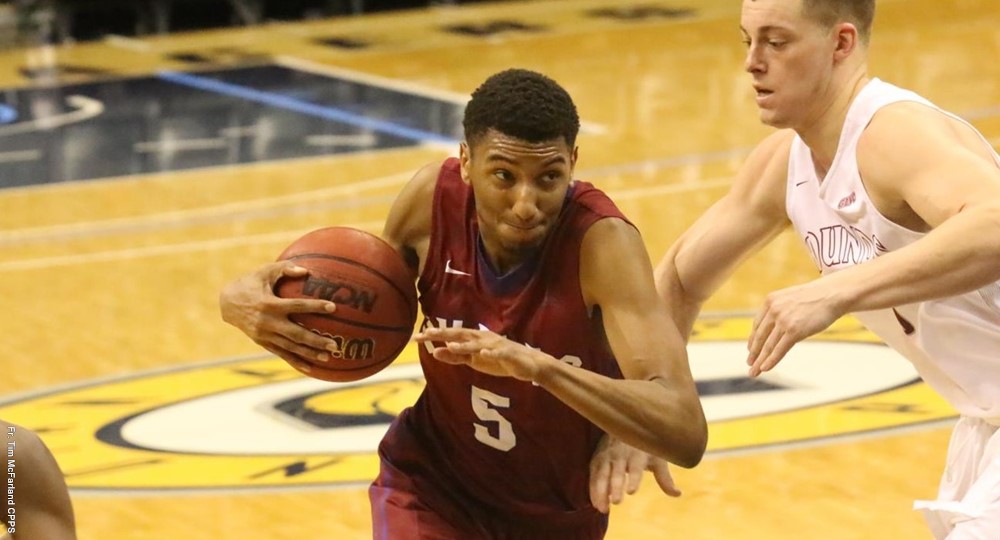
2016-17 Conference Per-Game Stats: 14.1 points, 7.8 rebounds, 2.0 assists, 2.1 blocks, 1.2 steals, FGs: 52.3% FT: 65%
Williams, a 6’6” junior, gets the nod over other borderline players such as Whelan, Velky and Simelton because he impacts the game in more ways. His long arms allow him to wreak havoc on the defensive side of the ball and dominate the offensive and defensive glass.
Williams, who leads the conference in offensive rebounds per game with 3.4, is also a good facilitator for his size and position. He averages two assists per game, which is virtually tied with Velky (1.8) and Whelan (2.2), and is slightly less than Simelton (3.0).
His offensive post game is still raw, but his athleticism allows him to consistently finish around the bucket. Despite lacking three-point range, he has good touch from mid-range, allowing him to consistently knock down shots from that range.
Nevertheless, with St. Joe’s closing after this year, whomever Williams plays for next will receive a good athlete capable of impacting both sides of the ball.
- Alec Brown, G, Wisconsin-Parkside

2016-17 Conference Per-Game Stats: 18.5 points, 2.5 rebounds, 3.0 assists, 0.9 steals, FGs: 55%, 3FGs: 41%, FTs: 78%
Brown is a smooth scorer who can hit from all three levels (paint, mid-range, and beyond the arc). Although his shooting has drastically improved from last season (FG, 3FG and FT percentage all up by ten percent or more), he is at his best when attacking the hoop, where he consistently finishes with both hands.
One of Brown’s best traits is that he plays in control, knowing his limits and playing within them most of the time. He is also a crafty passer who can make plays for others, and is a sneaky defender capable of guarding multiple positions. He’s far from flashy but still gets the job done.
Despite the major improvements, his jump shot has room for improvement. His form is unorthodox, as he moves the ball across his body and shoots rather slowly. This gives defenders more time to contest his shot and limits him in shot off the dribble scenarios. However, numbers do not lie. Brown is one of the most improved players in the conference and has admirably replaced Andy Mazurczak, last year’s GLVC Player of the Year, as Parkside’s leading scorer.
- Cory Myers, G, Truman State
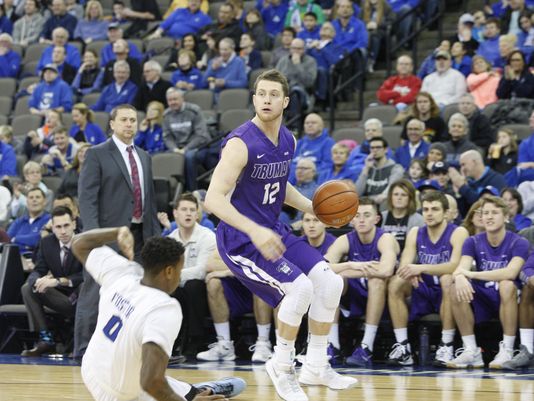
2016-17 Conference Per-Game Stats: 13.5 points, 4.3 rebounds, 5.0 assists, 2.3 steals, FGs: 46%, 3FGs: 41%, FTs: 77%
Because of the emergence of a few other notable guards in the conference, Truman State senior Cory Myers, who was named to last year’s First-Team All-GLVC Team, has been overlooked.
While Jake Velky is Truman State’s top scorer and outside threat, Cory Myers is the force that drives them. He does just about everything on the court, as evidenced by his triple-double against Maryville on Jan. 19. He is also one of just two players in the conference to crack the top 35 in scoring, top 45 in rebounding and top five in assists and steals. “Cory… [has] a great work ethic which has allowed [him] the opportunity to have success,” said Chris Foster, Truman State Head coach. “[He] also [has] great leadership qualities that challenge teammates and raise the level of the team.”
The only knock on Myers is that he lacks one consistent offensive skill that separates him from the other elite players in the conference. While he is the only player who comes close to Adam Eberhard and Jeril Taylor’s all-around games, he’s missing that one distinct quality to catapult him into their class, whether it be extraordinary passing, lights out three-point shooting, or elite athleticism, for example.
In spite of that, Myers leads a well-rounded Truman State team that is poised to challenge for a conference title.
- Evan McGaughey, F, Quincy
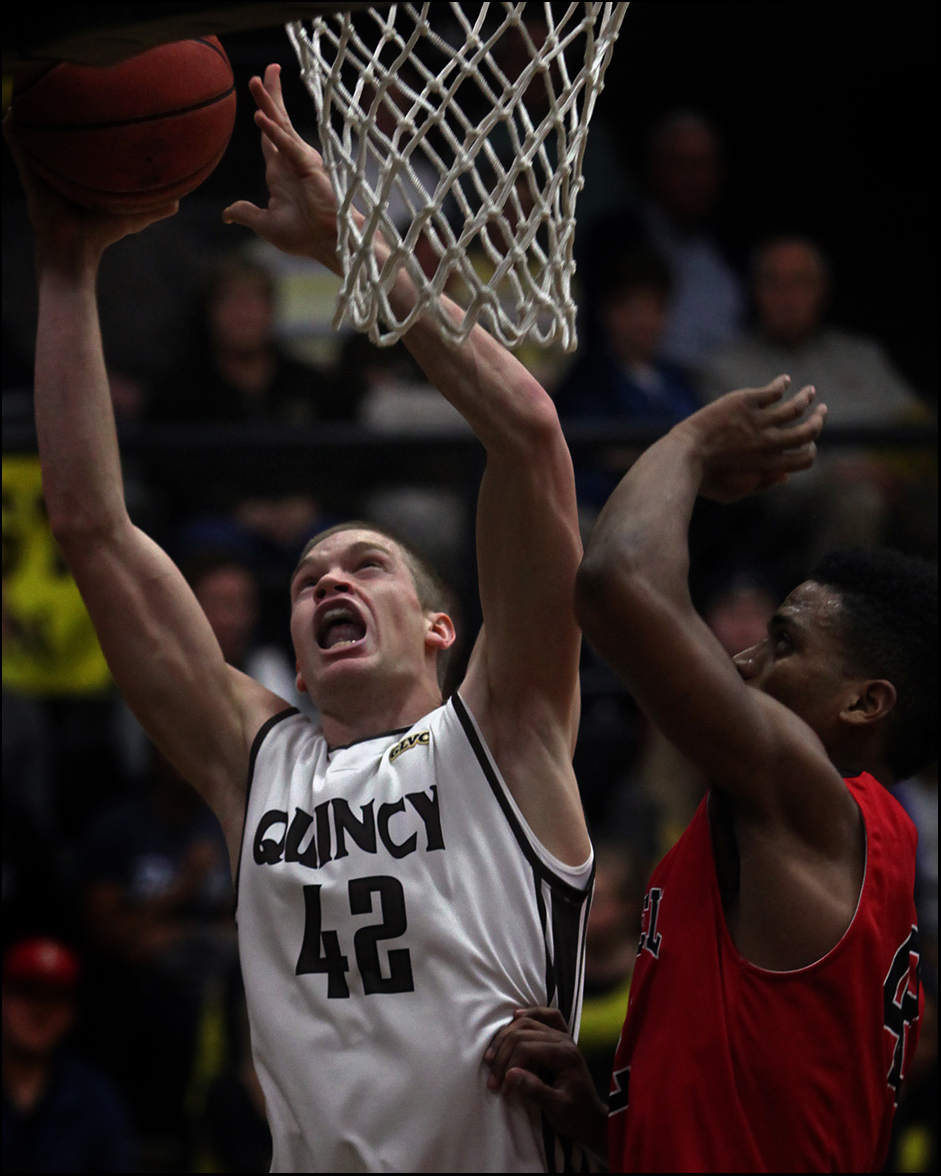
2016-17 Conference Per-Game Stats: 17.6 points, 8.9 rebounds, 2.3 assists, 1.4 blocks, 1.4 steals, FGs: 57%, 3FGs: 48%, FTs: 79%
McGaughey, the best stretch big in the conference, uses his 6’8” size as an advantage on both sides of the ball. He is capable of snatching offensive and defensive rebounds, as well as finishing around the rim. McGauhey has used his length and leaping ability to block the fifth most shots in conference play. Yet it is his anticipation, which is uncommon for a power forward or center, that separates him from other players in the conference, as he has forced the fifteenth most steals in the conference.
With his back to the basket, McGauhey isn’t as polished as teammate Joe Tagarelli, but can still hold his own. He does a great job relocating to the perimeter when Tagarelli is double-teamed, allowing Tagarelli to pass to him for a jump shot if needed. “Tagarelli and McGaughey each have skill sets that complement each other and our perimeter players as well,” Quincy head coach Marty Bell said. “It’s that blend on the floor that makes them both very effective.”
- Alex Stein, G, Southern Indiana

2016-17 Conference Per-Game Stats: 17.1 points, 3.6 rebounds, 3.8 assists, 0.6 steals, FGs: 50%, 3FGs: 38%, FTs: 92%
The main reason Stein is ranked one spot ahead of McGaughey is because Stein has consistently created his own shots, whereas McGaughey relies heavily on opponents doubling Joe Tagarelli and leaving him open for uncontested looks.
Stein’s mid range pull up game is second to none in the conference, and is in large part due to his quick first step. Weather he’s coming off of a screen or is isolated one-on-one, Stein realizes when he has the defender backpedaling. Once he sees this, he explodes into a quick pull up for an uncontested mid range jumper.
At times this year, Stein has carried tenth ranked Southern Indiana on offense. In the nine conference games which Jeril Taylor, Stein’s superstar teammate, has shot below his season average of 45% from the field, Stein has averaged 18 points and 4.2 assists. In the eight remaining conference games in which Taylor has shot over 45%, Stein averaged 16 points and 3.3 assists. Simply put, in games where Taylor has struggled, Stein has stepped up, averaging two more points and nearly one more assist.
Stein is also a solid ball handler and distributor. He’s given Southern Indiana a second reliable shot creator, something they lacked last season.
- Rusty Troutman, G, Bellarmine
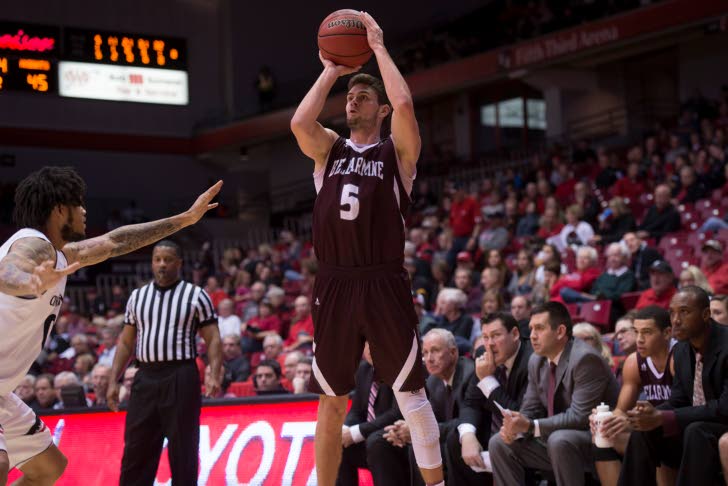
2016-17 Conference Per-Game Stats: 14.9 points, 3.4 rebounds, 3.9 assists, 1.3 steals, FGs: 54%, 3FGs: 49%, FTs: 81%
Although his stats have dipped from his stellar 2015-16 season, Troutman is still shooting 54% from the field, just 2 percent less than last season, and has improved his three-point percentage by five percent. The fact that Troutman has willingly accepted a secondary role to Adam Eberhard, the best all-around player on Bellarmine’s team, shows Troutman’s unselfishness.
Troutman and Eberhard work together better than any two players in the conference. They both are always one play ahead of the defense and anticipate what one another will do next. The duo has helped push Bellarmine to a top five national ranking and has paved the way for Bellarmine to find what works best for them on offense – a process that has been fun to watch.
Troutman’s movement without the ball has been critical to Bellarmine’s offense this season. Whenever the ball is in Eberhard’s hands and Troutman’s defender turns to face the ball, Troutman quickly relocates to another spot on the perimeter, usually without the defender noticing. Eberhard, who possess a high basketball IQ, either fires a pass to Troutman for an open three, or hits him on a cut for a layup.
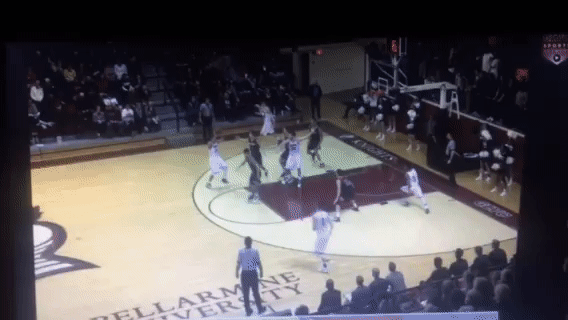
Bellarmine’s ball movement, especially on plays like this, has been a big reason behind Troutman’s success. “Rusty doesn’t need the ball in his hands to impact the game,” Bellarmine assistant coach Doug Davenport said. “He moves well without the ball and it not only frees himself up, it often creates shots or driving opportunities for other guys.”
Troutman’s 6’5” frame, along with his quickness, allows him to be a versatile defender, and his anticipation of passes has translated to just over one steal per game. While his stats may be down from last year, Troutman is an irreplaceable piece for Bellarmine, whom look like legitimate national championship contenders.
- Kendale McCullum, G, Wisconsin-Parkside
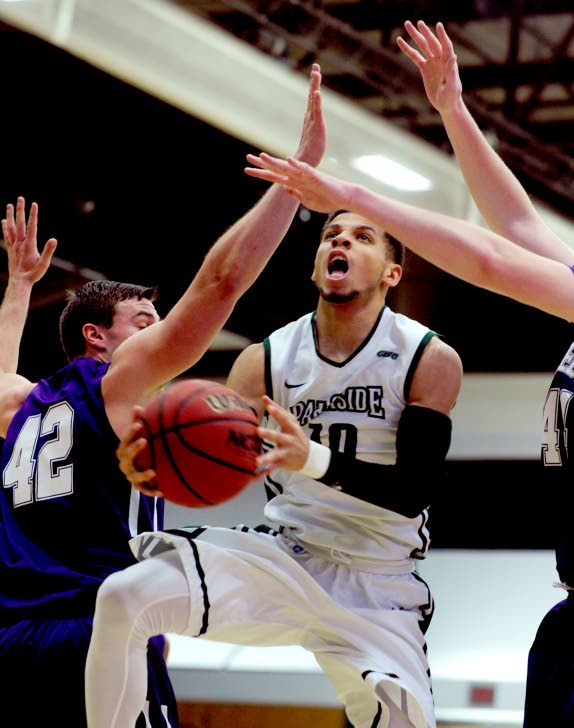
2016-17 Conference Per-Game Stats: 14.9 points, 4.9 rebounds, 5.9 assists, 2.3 steals, FGs: 46%, 3FGs: 27%, FTs: 77%
While Alec Brown has replaced Andy Mazurczak’s scoring, McCullum has replaced Mazurczak’s point guard duties by providing leadership, ball handling and great court vision.
McCullum is the best point guard in the conference and impacts many aspects of a game, both on offense and defense. The way he reads passes and breaks to the ball to force steals is arguably his best attribute.
His quickness off the dribble allows him to penetrate the lane, where he mixes in euro steps and floaters better than anyone in the conference. The only time this becomes a problem is when McCullum drives the lane and leaves his feet prematurely. Often times, this results in errant passes and bad shot attempts. For the most part, however, McCullum is a good decision maker who avoids these types of plays.
Despite not being the best shooter from downtown (27%), McCullum is capable of stepping up and hitting big shots when needed. He controls the tempo of the game and always knows when to speed up or slow down the pace. If McCullum displays that same game control throughout the postseason, Parkside has a chance to make an impact on the national level.
“Kendale is a very explosive player,” Wisconsin-Parkside head coach Luke Reigel said. “He can change a game on either end in a blink of an eye. When he’s playing the point guard position well, we are a very good team.”
- Joe Tagarelli, C, Quincy
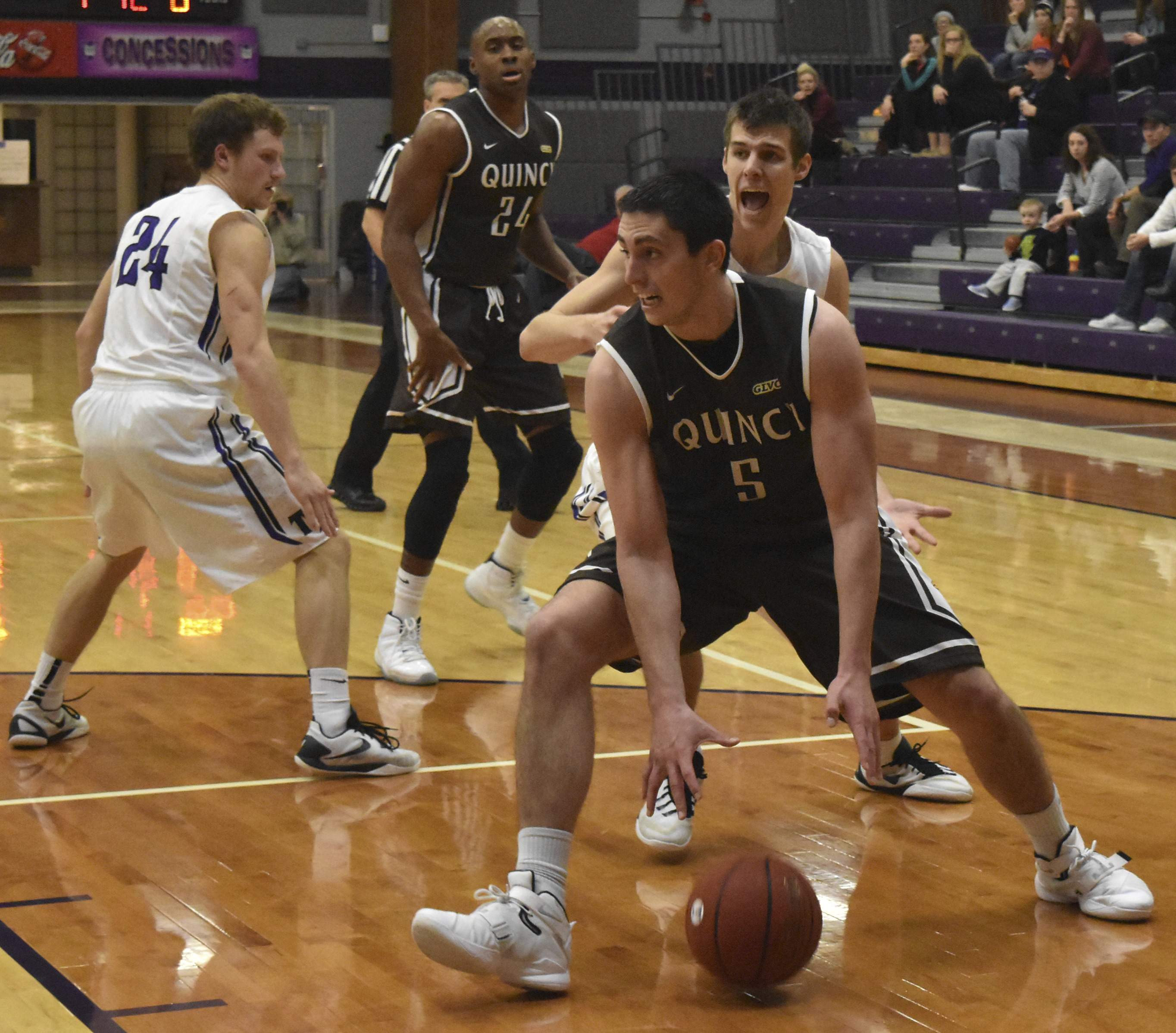
2016-17 Conference Per-Game Stats: 20.8 points, 7.8 rebounds, 2.7 assists, 0.6 blocks, 1.4 steals, FGs: 55%, FTs: 72%
One look at Joe Tagarelli’s season statistics would make any basketball fan assume that he is at least 6’8” or taller. He’s a top five rebounder in conference play, produces 3.2 offensive rebounds per game and has an unstoppable right hook shoot from the post. Yet, the fact that Tagarelli is just 6’5” is what makes him unique. He uses his wide frame to gain inside position on rebounds against taller players. That wide frame also allows him to effectively defend against those taller player. He wears opponents down with his rebounding and physical defense, has soft touch around the rim and is third in the GLVC in scoring without even attempting a three-point shot.
While Tagarelli is a good defender who uses his hands to force steals and poke balls loose, he can be too active with his hands at times. In 12 of the 17 conference games this season, Tagarelli has recorded 4 or more fouls, many of which come from unnecessary attempts to poke the ball free after his opponent pulls down a rebound. This constant foul trouble has limited him to just 27.5 minutes per game, a number that is significantly less than other star players. Here’s how Tagarelli stacks up against others in minutes played per game:
Cory Myers – 34.8 MPG
Evan McGaughey – 33.1 MPG
Kendale McCullum – 31.8 MPG
Kindred Williams – 31.6 MPG
Alec Brown – 31.1 MPG
Jeril Taylor – 30.9 MPG
Alex Stein – 30.8 MPG
Rusty Troutman – 29.3 MPG
Adam Eberhard – 28.6 MPG
Joe Tagarelli – 27.5 MPG
Bellarmine has routinely blown opponents out and hasn’t been forced to play Troutman or Eberhard much at the end of games, causing their numbers to be slightly skewed. On the other hand, one reason Quincy hasn’t routinely blown teams out is because of Tagarelli’s foul trouble.
Tagarelli has easily been one of the best GLVC players in the 2016-17 season. However, this lack of discipline, which has led to numerous amounts of foul trouble, has held him back from ascending his game even further to join the elite players in the nation.
- Jeril Taylor, G, Southern Indiana

2016-17 Conference Per-Game Stats: 21.0 points per game, 8.4 rebounds, 2.8 assists, 0.5 blocks, 1.3 steals, FGs: 45%, 3FGs: 44%, FTs: 77%
On Feb. 15, Taylor was named to smallcollegebasketball.com’s Bevo Francis Award Top 50 Watch List. John McCarthy, founder of Small College Basketball, had this to say about Taylor: “Jeril is an explosive scorer that is in the midst of an outstanding season.”
Taylor’s mix of skill and athleticism is unmatched within the conference. He is capable of finishing with both hands at the rim, setting up teammates and knocking down deep threes. His athleticism also allows him to posterize bigger defenders, as evidenced by this slam against an unidentified team:
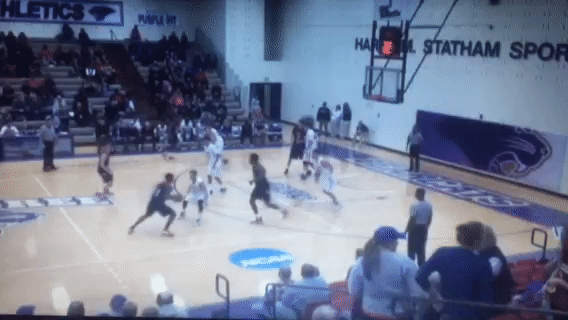
Taylor always has the ‘green light’ to shoot from beyond the arc and is lethal coming off of screens and when taking his defender one on one.
Despite standing just 6’4”, Taylor also attacks the glass hard and is third in the conference in rebounding. He is an underrated passer who sets up his teammates well, with crafty combinations of wraparound and drop-off passes in the lane for his bigger teammates, such has Julius Rajala and DayJar Dickson.
Taylor’s complete skill set was best displayed on Jan. 12 against Truman State, when he compiled a career high 50 points on 13 of 15 field goals, including 9 of 9 three pointers. Taylor attempted an astounding 20 free throws, converting 15 of them. He rounded out the game with nine rebounds, six assists and three steals. What’s even more impressive is that Taylor tweeted this before his outburst vs. Truman State:
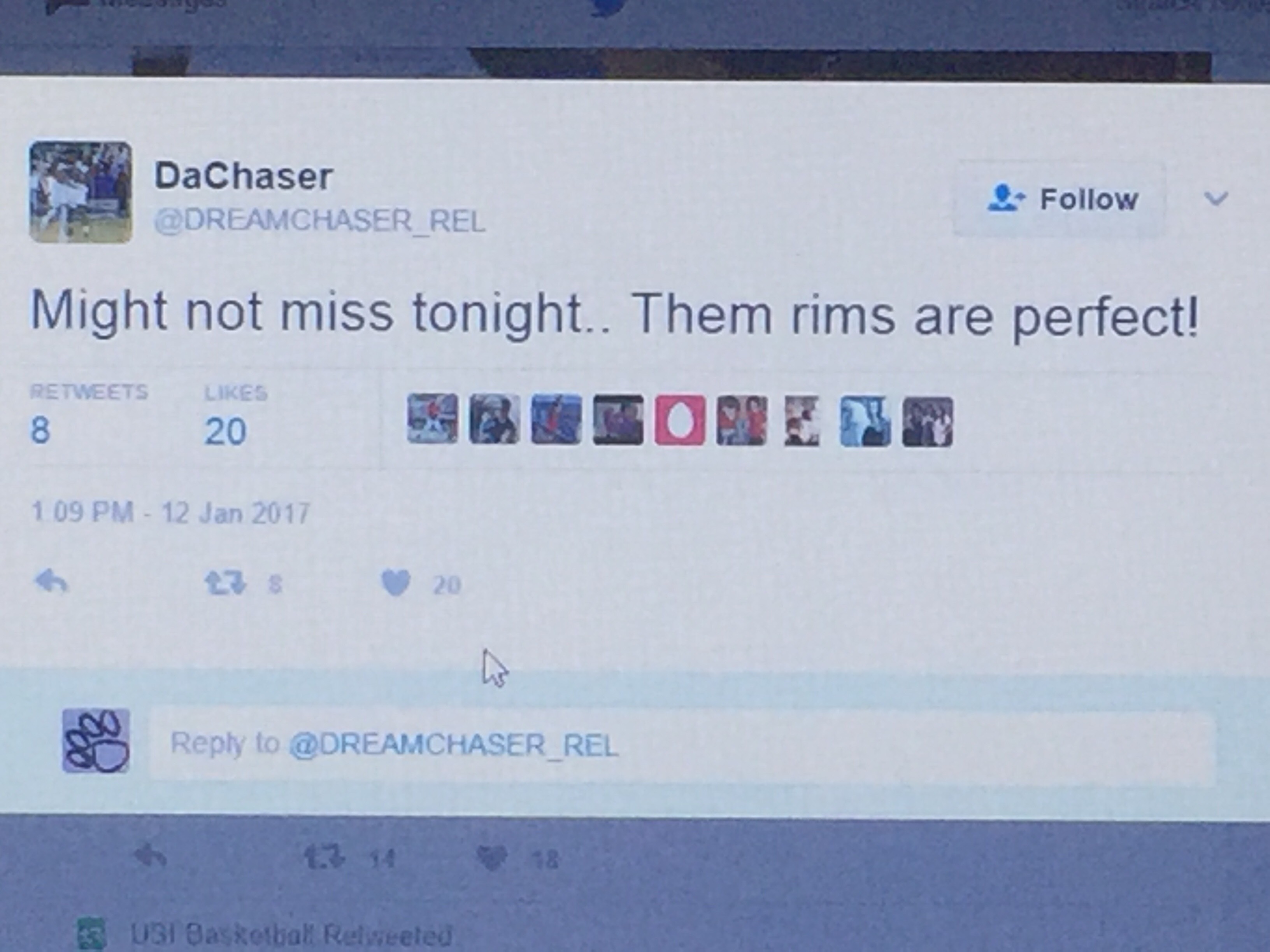
As mention earlier (Alex Stein’s section), Taylor has, however, had his share of struggles this season. His jump shot has been inconsistent at times and he sometimes overuses his ‘green light’ to shoot. However, when Taylor plays like he did against Truman State, no one in the conference can compare to him, and few players in the country can either.
- Adam Eberhard, F, Bellarmine

2016-17 Conference Per-Game Stats: 16.4 points, 7.3 rebounds, 4.7 assists, 0.4 blocks, 0.5 steals, FGs: 57%, 3FGs: 40%, FTs: 89%
Bellarmine sophomore Adam Eberhard isn’t just an elite GLVC player, but a nationally elite player as well. Of the top 25 ranked teams in Division II, Eberhard is one of just two players to lead his team in points, rebounds and assists (Michael Smith from California Baptist is the other).
Along with Taylor, Eberhard was also named to the Bevo Francis Award Top 50 Watch List. “Adam is a very well-rounded player who leads a very good Bellarmine team,” said John McCarthy. “He’s a versatile 6’8” player that does so much to help his team win, much of which doesn’t show up in a box score.”
Eberhard plays with patience, but also recognizes when to take a risk. He’s intelligent enough to realize when he should attempt a difficult pass and also knows when to hang onto the ball to extend a possession. Fundamentally wise, Eberhard is as solid as it gets. Defensively, he isn’t a great shot blocker, but consistently contests his opponent’s shots, plays passing lanes well and rarely gets beat on backdoor cuts.
Eberhard’s signature skills are his court vision and passing ability. Since Bellarmine’s offense is full of continuous motion and ball movement, Eberhard is the perfect centerpiece. He’s an unselfish passer who rarely misses an open cutter, and even mixes in flashy passes:
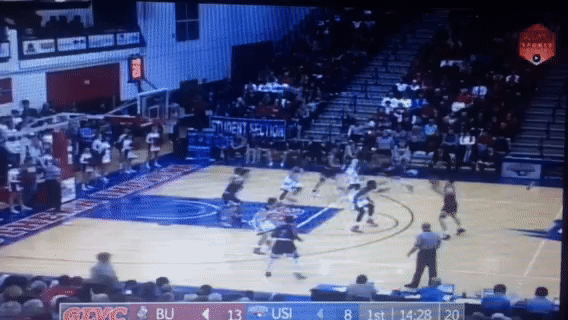
“It doesn’t matter where he plays on the court, we can run things through him because of his ability to find teammates or make plays off the bounce,” Bellarmine assistant coach Doug Davenport said. “Adam is gifted with an uncanny ‘feel’ for the game. He reminds me a bit of Braydon Hobbs (2012 national POY), whom I played with, for his ability to see things in slow motion.”
On Eberhard’s competitiveness, Davenport said “He’s probably the biggest sports nut in the program. He’ll watch any basketball/football/baseball game he can find and I think that’s due to his competitive fire that reveals itself during games, shooting drills [and] practices.”
Eberhard’s skills extend far beyond passing the ball, as he is capable of scoring off the dribble, with his back to the basket, off of face-ups and from catch and shoot opportunities. He is the best all-around player in the conference, and one of the best in the nation.